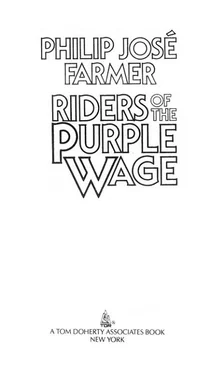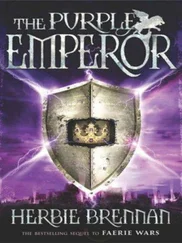Meanwhile, Gnatcatcher and his IRS contingent were outside the house. With them were National Guard units equipped with tanks and rocket-launchers.
Agrafan and Netter radioed their farewells, knowing that they would probably be dead before the message reached home.
“Well, it’s not so bad to end this,” Netter said. “I’ve been suffering from the heat ever since I got here. Now, I’ll be comfortable. Death is comfortable, isn’t it?”
“We’ll find out,” Agrafan said. “Anyway, there’s usually something good to say about any situation. Don’t the Earth people have a word for that attitude?”
“Pollyanna.”
“I had a teacher named that. No connection, of course.”
“Don’t die thinking that,” Netter said. “It makes it seem that you’ve learned nothing, wasted your life. All things impinge. Nothing moves without being moved or moving other things.”
“Sorry,” Agrafan said. “I’ve been here too long. I’m starting to think like them .”
Agrafan punched a button. Its last thought was of home, of the deliciously cold clouds, of flying through them, of ecstasy felt when he had been young and foolish and had dived as deep as he could, coming dangerously close to the hot, liquid hydrogen layer. Earth people did not know what fun was.
The insulated room with its frozen carbon dioxide furniture and emergency bottles of methane-hydrogen-helium gas and the TV set with the infrared screen vanished in a gout of flame. Nothing would be left for the Earth people to identify Agrafan and Netter as nonterrestrials.
Gnatcatcher ran as fast as be could, but the heat, far greater than that in his belly, caught up with him and passed him.
The Making of
Revelation, Part I
God said, “Bring me Cecil B. DeMille.”
“Dead or alive?” the angel Gabriel said.
“I want to make him an offer he can’t refuse. Can even I do this to a dead man?”
“Oh, I see,” said Gabriel, who didn’t. “It will be done.”
And it was.
Cecil Blount DeMille, confused, stood in front of the desk. He didn’t like it. He was used to sitting behind the desk while others stood. Considering the circumstances, he wasn’t about to protest. The giant, divinely handsome, bearded, pipe-smoking man behind the desk was not one you’d screw around with. However, the gray eyes, though steely, weren’t quite those of a Wall Street banker. They held a hint of compassion.
Unable to meet those eyes, DeMille looked at the angel by his side. He’d always thought angels had wings. This one didn’t, though he could certainly fly. He’d carried DeMille in his arms up through the stratosphere to a city of gold somewhere between the Earth and the moon. Without a space suit, too.
God, like all great entities, came right to the point.
“This is 1980 A.D. In twenty years it’ll be time for The Millennium. The day of judgement. The events as depicted in the Book of Revelation or the Apocalypse by St. John the Divine. You know, the seven seals, the four horsemen, the moon dripping blood, Armageddon, and all that.”
DeMille wished he’d be invited to sit down. Being dead for twenty-one years, during which he’d not moved a muscle, had tended to weaken him.
“Take a chair,” God said. “Gabe, bring the man a brandy.” He puffed on his pipe; tiny lightning crackled through the clouds of smoke.
“Here you are, Mr. DeMille,” Gabriel said, handing him the liqueur in a cut quartz goblet. “Napoleon 1880.”
DeMille knew there wasn’t any such thing as a one-hundred year old brandy, but he didn’t argue. Anyway, the stuff certainly tasted like it was. They really lived up here.
God sighed, and he said, “The main trouble is that not many people really believe in Me any more. So My powers are not what they once were. The old gods, Zeus, Odin, all that bunch, lost their strength and just faded away, like old soldiers, when their worshippers ceased to believe in them.
“So, I just can’t handle the end of the world by Myself any more. I need someone with experience, know-how, connections, and a reputation. Somebody people know really existed. You. Unless you know of somebody who’s made more Biblical epics than you have.”
“That’ll be the day,” DeMille said. “But what about the unions? They really gave me a hard time, the commie bas…uh, so-and-so’s. Are they as strong as ever?”
“You wouldn’t believe their clout nowadays.”
DeMille bit his lip, then said, “I want them dissolved. If I only got twenty years to produce this film. I can’t be held up by a bunch of goldbrickers.”
“No way,” God said. “They’d all strike, and we can’t afford any delays.”
He looked at his big railroad watch. “We’re going to be on a very tight schedule.”
“Well, I don’t know,” DeMille said. “You can’t get anything done with all their regulations, interunion jealousies, and the feather-bedding. And the wages! It’s no wonder it’s so hard to show a profit. It’s too much of a hassle!”
“I can always get D. W. Griffith.”
DeMille’s face turned red. “You want a grade-B production? No, no, that’s all right! I’ll do it, do it!”
God smiled and leaned back. “I thought so. By the way, you’re not the producer, too; I am. My angels will be the executive producers. They haven’t had much to do for several millennia, and the devil makes work for idle hands, you know. Haw, haw! You’ll be the chief director, of course. But this is going to be quite a job. You’ll have to have at least a hundred thousand assistant directors.”
“But…that means training about 99,000 directors!”
“That’s the least of our problems. Now you can see why I want to get things going immediately.”
DeMille gripped the arms of the chair and said, weakly, “Who’s going to finance this?”
God frowned. “That’s another problem. My Antagonist has control of all the banks. If worse comes to worse, I could melt down the heavenly city and sell it. But the bottom of the gold market would drop all the way to hell. And I’d have to move to Beverly Hills. You wouldn’t believe the smog there or the prices they’re asking for houses.
“However, I think I can get the money. Leave that to Me.”
The men who really owned the American banks sat at a long mahogany table in a huge room in a Manhattan skyscraper. The Chairman of the Board sat at the head. He didn’t have the horns, tail, and hooves which legend gave him. Nor did he have an odor of brimstone. More like Brut. He was devilishly handsome and the biggest and best-built man in the room. He looked like he could have been the chief of the angels and in fact once had been. His eyes were evil but no more so than the others at the table, bar one.
The exception, Raphael, sat at the other end of the table. The only detractions from his angelic appearance were his bloodshot eyes. His apartment on West Side had paper-thin walls, and the swingers’ party next door had kept him awake most of the night. Despite his fatigue, he’d been quite effective in presenting the offer from above.
Don Francisco “The Fixer” Fica drank a sixth glass of wine to up his courage, made the sign of the cross, most offensive to the Chairman, gulped, and spoke.
“I’m sorry, Signor, but that’s the way the vote went. One hundred percent. It’s a purely business proposition, legal, too, and there’s no way we won’t make a huge profit from it. We’re gonna finance the movie, come hell or high water!”
Satan reared up from his chair and slammed a huge but well-manicured fist onto the table. Glasses of vino crashed over; plates half-filled with pasta and spaghetti rattled. All but Raphael paled.
Читать дальше









![О Генри - Пурпурное платье [The Purple Dress]](/books/405339/o-genri-purpurnoe-plate-the-purple-dress-thumb.webp)

